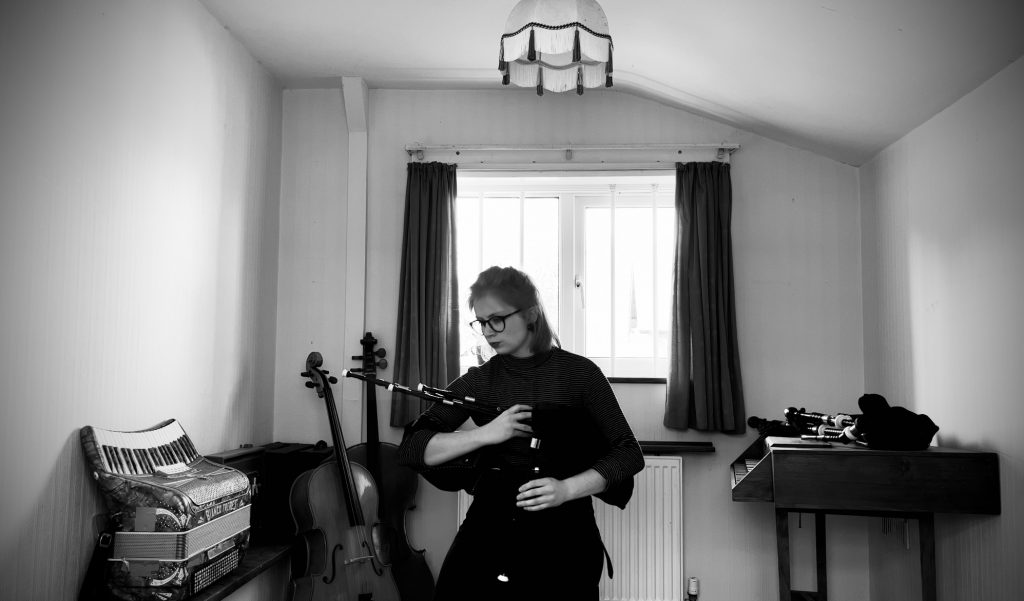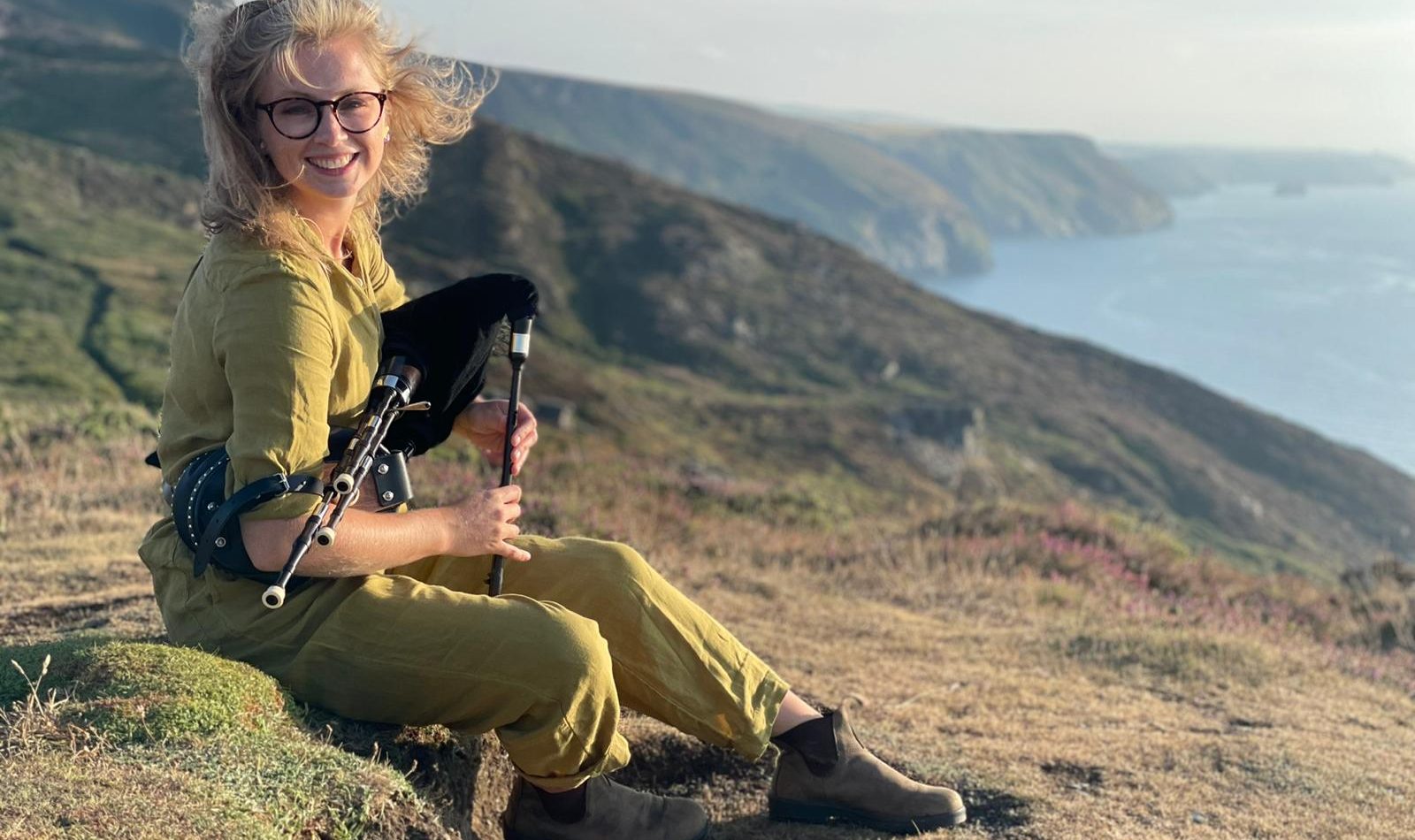In just under a month’s time we will begin recruitment for the third year of our Musicians in Residence programme.
Ahead of this, we’re sharing the latest in a series of in-depth conversations with the current cohort of residents, this time with cellist and piper Hattie McCall Davies.
A graduate from the Royal Academy of Music, Hattie is a cellist, piper, and a long-standing member of Paraorchestra whose adept playing most recently featured on The Unfolding, Death Songbook and Symphony of Sorrowful Songs.
In many ways, Hattie’s experience of being a Musician in Residence embodies the values and intent of the programme. Focussing on the Scottish Smallpipes, Hattie’s year in residence has seen her undertake bold new creative pursuits and developing a practice that might otherwise be neglected through the pressures of gigging and commercial work.
Our 2022–3 residency is the second of two years funded through a genrous bursary from Sky Arts as part of Charles Hazlewood’s appointment as their Ambassador for Music.
You’ve worked with Paraorchestra for a number of years – why did this year in particular feel right to take the leap with the MiR programme?
I had been keen to apply when first year of residencies were announced but I didn’t quite feel ready. I was really inspired by the variety in the output of the first three musicians-in-residence and this encouraged me to have a go.
Practically speaking I had only recently transferred to the Smallpipes from the Highland Bagpipes. There were things I wanted to do and explore to improve my playing and I knew the residency could help me with that.
There was also an element of now or never! Some work that I do away from music, in addition to my cello and piping, was starting to take off and I knew that if I didn’t earmark some time for piping I might never get that time again. My application was all about creating time for my artistic practice – and as I was time poor – I didn’t want to let the opportunity pass me by!
When I got my Smallpipes it felt like I was given my musical voice back – I felt like I could fly
Your work with Paraorchestra to date has been primarily in your capacity as a cellist – could you talk a bit more about your relationship with piping and some of the traditions you’re exploring?
Piping has always been a huge part of my life but one that I have kept under wraps – after all, there aren’t many piping jobs going in London orchestras!
My relationship with the bagpipes most people are familiar with (the great highland pipes or GHB) began when I was very young and I used to be taken to see the Tattoo at Edinburgh castle every summer during the Festival.
The first time I ever heard and saw the visceral sight of the massed pipes and drums walking over the castle bridge in the mist I was hooked.
Throughout my formative musical years, and through my teens and studies I always had a practice chanter (stolen off my Dad!) and would experiment with drones in my cello playing – detuning, adding a shruti box into my playing, constantly wanting open fifths in every tune I wrote.
I graduated from the Royal Academy of Music eight years ago now – and in that time my cello playing and music making ebbed and flowed due to the effects Ehlers Danlos Syndrome was having on my body – I was utterly devastated that it felt like my body was taking away my identity – my ability to play the cello. I felt muted artistically and musically heartbroken. In the times when I couldn’t play the cello however and every fibre of my being was yearning to be making some sort of music, the one thing I could physically still play was my pipes.
I had been desperate for a set of Scottish Smallpipes for years, as being a GHB piper was a little limiting in terms of where and when I could practice (the neighbours don’t love me!) as well as the limits such a loud and uniquely tuned instrument put on who and what instruments I could easily play with.
I sensed that the Scottish Smallpipes were my instrument – I fell in love with their quieter, sweet, and melodious sound, as well as the pitch stability that a bellows blown instrument would bring, and its versatility in an ensemble environment. It felt like the instrument I was ‘meant’ to play, but I had a problem. I didn’t own a set!
As it is so often in life fate intervened. My grandmother very sadly died unexpectedly in 2019 and I was incredibly fortunate that she left me a small amount of money. This allowed me to buy my Smallpipes – without this final gift from her I would never be where I am today. When I got my Smallpipes it felt like I was given my musical voice back – I felt like I could fly…as a lifelong lover of the bagpipes I think my grandmother would have approved.

Is there anything that’s intrigued or surprised you about the instrument as you’ve delved into it during your residency?
The most obvious – if not surprising – thing has been the difference having time to properly practice has made. We all know as musicians that contact time is the root of everything good in our playing. But as a cellist I had never prioritised piping time. Now that I get to spend hours every day with my pipes they have become like an extension of me – of my lungs and my arms.
The other thing perhaps is the more time I spend piping the more I want to push the boundaries of what music I can play. But I only have nine notes! With no real chromatic capability on the smallpipes I perhaps didn’t anticipate quite how much that would initially frustrate me but then push me to be far more creative in how I transpose material for playing on the smallpipes.
Could you tell us a little more about any collaborators you’ve been working with?
So far I’ve been working in a bit of a solo piping bubble – however, I’m really excited about some collaborations coming up. In a few weeks I’m off up to Glasgow during Celtic Connections to spend a week having lessons, participating in workshops, and listening to some amazing smallpipers including Finlay McDonald, Ross Ainslie, and Ailis Sutherland.
I’m also now in touch with two piping heroes of mine – Allan McDonald and Callum Armstrong about some lessons – in piobaireachd and English piping traditions – and hope to have something in the diary soon.
These are all opportunities to interact with other pipers that I would never have had without the residency.
I am also developing a plan with the Paraorchestra team for an R&D towards the end of my residency – two days of sessions with a small group of fellow musicians to experiment with incorporating the smallpipes into a less ‘traditional’ instrument ensemble and to work on music inspired by piping traditions from all over the world– watch this space!
The beautiful thing about this programme is how gloriously supportive it is of an evolving artistic practice.
Can you tell us more about how the MiR programme compares to other programmes of development or study you’ve undertaken before?
I haven’t really done anything like this before. My undergraduate at the Royal Academy of Music was of course an extremely structured and exam-based programme of study and it definitely narrowed my mental parameters in terms of artistic freedom on my instrument.
The beautiful thing about this programme is how gloriously supportive it is of an evolving artistic practice. With no requirement for set outcomes at the end, it has allowed me to follow my musical nose and see where my playing takes me. Removing that outside pressure for something demonstrable has allowed me to quietly develop in confidence on the smallpipes in intangible ways that will contribute in their own way to much more tangible outcomes in terms of a wider repertoire selection at my finger tips, new musical colleagues and relationships made, and a renewed faith in a new musical voice for me – as a piper rather than as a cellist.
What do you hope to get out of your year in the MiR programme?
This year for me has all been about laying the groundwork. Having the time to discover who I am as a piper so that I can take that out into the wider world and start breaking ground in terms of performing, and collaborating. A lot of time has been spent on my own practising but also developing ideas that I will take forward beyond my residency for online content, tune research and performing.
I hope to come out with new musical colleagues, a more diverse and varied body of repertoire, as well as a renewed confidence as a musician and enthusiasm for the music that I make.
Follow Hattie @HattieMcD
**
The Paraorchestra Musicians in Residency programme was created in recognition of a lack of professional support and development opportunities for musicians identifying as D/deaf, disabled, or neurodivergent.
The bursary from Sky Arts, which formed part of Charles Hazlewood’s appointment as their Ambassador for Music, currently supports two Musicians in Residence.






